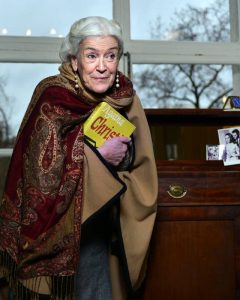

When the popular British comedienne Margaret Rutherford was cast as Agatha Christie’s brilliant amateur detective Miss Jane Marple for a series of British movies in the 1960s she wasn’t quite sure she wanted the job. And Christie wasn’t quite sure she wanted Rutherford. Rutherford’s life and her relationship with the character of Miss Marple, as well as her conflicts with the iconic mystery writer who created her form the basis of the play Murder, Margaret and Me, produced by Gilded Balloon Edinburgh. The one-woman show, which premiered at the 2012 Edinburgh Fringe Festival and subsequently toured England, is now playing at the Abrazo Interno Theatre at The Clemente for the 18th New York International Fringe Festival.
The play stars Janet Prince as Rutherford, Christie and Miss Marple. We first meet the beloved actress Rutherford, known at the time as The Funniest Woman Alive, and we learn a bit about her life and career. She resists the role of Miss Marple at first, seeing the macabre subject matter of the film as something rather sordid. “I have never found murder amusing,” she snorts. She accepts the part anyway and on the first day of shooting she meets the iconic writer Agatha Christie, who, as a creator of wildly popular mystery novels, sees herself as something of a detective. Christie suspects that there is a dark mystery somewhere inside the comic star, and she determines to find out just what it is during a high tea for just the two of them in Rutherford’s dressing room. She explores the actress’s past and discovers a family history of madness, suicide and murder. Just Agatha Christie’s cup of tea.
Philip Meeks’ script is full of wit and interesting tidbits about Rutherford’s life. It rambles a bit; Rutherford’s childhood in India is referenced by Indian music and a few words blurted out by Prince, but it does not connect to anything else in the play and is just left hanging there. Also it is unclear as to whom Rutherford is telling this story or why. But Meeks contrasts the characters of Rutherford and Christie quite nicely. Christie has a sharp wit of her own in addition to her own standards of quality. She confesses skepticism regarding Rutherford’s suitability for the part. And when she learns that the unknown director George Pollack is going to oversee the film Murder She Said, based upon one of her novels, Christie quips, “Daphne [Du Maurier] gets Hitchcock.”
Actress Janet Prince creates fully realized characterizations of the two women. In an instant she changes her voice, posture and even her face to transform from one to the other, even as the two of them share intimate conversations. As Rutherford she is tough, seemingly strong enough to put the entire audience into a half Nelson. As Christie she is prim, alert yet assertive, her face taking on a resemblance to Vanessa Redgrave (who played Christie in a 1979 film) and her voice becoming softer and more elegant. Despite Prince’s moving back and forth between the two in rapid succession there is never any doubt as to which of them is there in the moment, telling her side of the story. It is an impressive performance that should be seen by young actors who may face similar creative challenges in the future.
I would have liked to have seen more of Miss Marple, both in the script and in the performance. After all, she is the one who brought the two artists together and may have come to know them both better than they knew themselves. Nevertheless, Murder, Margaret and Me is an interesting look behind the curtain of a popular series of films and a glimpse into how an iconic actor and an iconic writer came together, despite conflicts, to create an iconic film character.
Murder, Margaret and Me continues its run through August 22 as part of the New York International Fringe Festival. For more on FringeNYC shows, click here.
Through August 22 at the Abrazo Interno Theatre at The Clemente